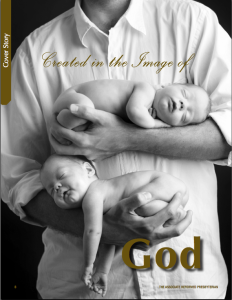By: RC Sproul
 In biblical terms, the sanctity of human life is rooted and grounded in creation. Mankind is not viewed as a cosmic accident but as the product of a carefully executed creation by an eternal God. Human dignity is derived from God. Man as a finite, dependent, contingent creature is assigned a high value by his Creator.
In biblical terms, the sanctity of human life is rooted and grounded in creation. Mankind is not viewed as a cosmic accident but as the product of a carefully executed creation by an eternal God. Human dignity is derived from God. Man as a finite, dependent, contingent creature is assigned a high value by his Creator.
The creation account in Genesis provides the framework for human dignity: “Then God said, ‘Let us make man in our image, after our likeness. And let them have dominion over the fish of the sea and over the birds of the heavens and over the livestock and over all the earth and over every creeping thing that creeps on the earth.’ So God created man in his own image, in the image of God he created him; male and female he created them” (Genesis1:26–27).
Creation in the image of God is what sets humans apart from all other creatures. The stamp of the image and likeness of God connects God and mankind uniquely. Though there is no biblical warrant for seeing man as godlike, there is a high dignity associated with this unique relationship to the Creator.
It has often been suggested that whatever dignity was given mankind through creation was erased or canceled through the fall. Since evil mars the countenance of human beings, is the original image still intact?
Because of the fall, something profound has stained the greatness of humanity. Therefore, we now must distinguish between the image of God in its wide and narrow senses.
The image of God in the narrow sense concerns mankind’s ethical capacity and behavior. In creation, man was given the ability and the responsibility to mirror and reflect the holy character of God. Since the fall, the mirror has been splotched by the grime of sin. We have lost our capacity for moral perfection, but we have not lost our humanity with this ethical loss. Man may no longer be pure, but he is still human. Insofar as we are still human, we retain the image of God in the wider sense. We are still valuable creatures. We may no longer be worthy, but we still have worth. This is the resounding biblical message of redemption. The creatures God created are the same creatures He is moved to redeem.
Because Christians speak so tirelessly about human sin, do they have a low view of humanity? Indeed, they have a low view of human virtue, but not a corresponding low view of human worth or importance. It is precisely because the Bible has such a high view of human dignity that Christians take human sin so seriously. If one rat steals another rat’s food, we don’t get morally outraged. But if one human steals another human’s food, we rightly become concerned.
The biblical view indicates that human theft is more serious than rat theft because humans are a higher order of being. As the psalmist indicated, we are created “a little lower than the heavenly beings” (Psalm 8:5).
This ranking of value is deeply rooted within our own humanity. For instance, when a president of the United States is killed, we do not refer to the deed merely as homicide or murder. We have a special word for it: assassination.
During the news reports that followed the announcement of the assassination of President Kennedy, the reporters seemed to have difficulty finding words powerful enough to express their outrage. They called the assassination “diabolical,” “fiendish,” “inhuman,” and other such terms. I wondered at the time what made it difficult to describe Kennedy’s murder simply as one human being killing another human being. Not only a devil or a fiend can commit murder. A person is not instantly shorn of humanity when he kills another human. Lee Harvey Oswald was a human being when he pulled the trigger in Dallas.
Does this mean, then, that in the hierarchy of value President Kennedy had more human dignity than Officer Tippet, who was killed the same day in the same city by the same man? By no means! The murder of Officer Tippet was just as much an assault on his dignity as the murder of Kennedy was on his. Each was a human person. Each had personal worth and dignity. Kennedy’s person was no more laden with dignity than Tippet’s. What made the outrage over Kennedy’s death greater than that over Tippet’s death was the office Kennedy held. He was the president of the United States. He was the supreme publica persona of our land.
It is by similar reason that an offense against a human is more outrageous than an offense against a rat. Both the rat and the human are creatures created by God. But the “office” of a person is considerably higher than the “office” of the rat. It is mankind—not the rat—who is made in the image of God. It is the human who is given a role of dominion over the earth. Man, not the rat, is God’s vice-regent over creation.
From Ligonier Ministries and R.C. Sproul. © Tabletalk magazine. Website: www.ligonier.org/tabletalk. Email: tabletalk@ligonier.org. Toll free: 1-800-435-4343.
